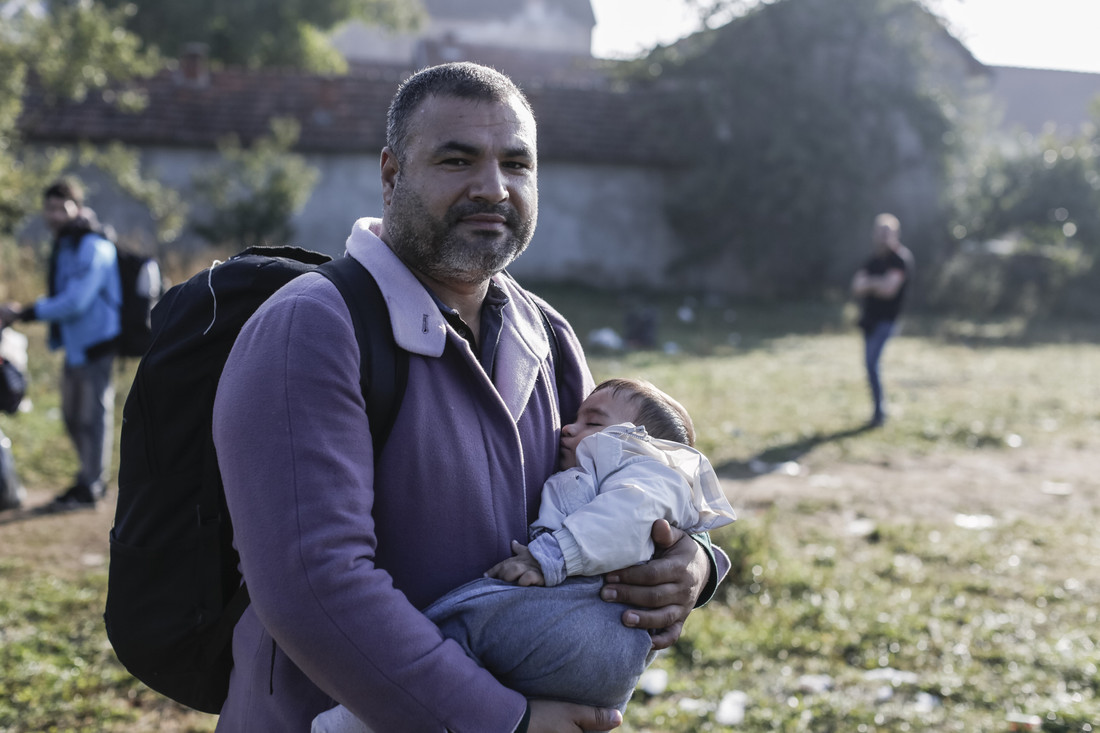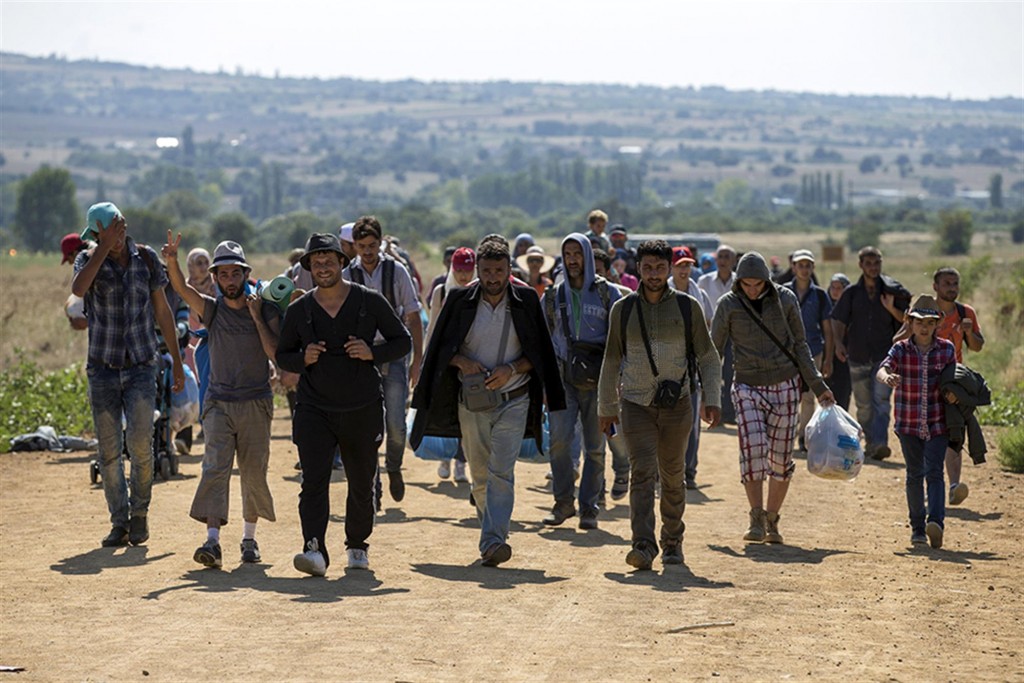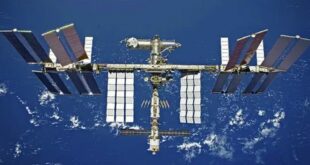
Photo credit: Sam Tarling / Oxfam
The desperate plight of refugees fleeing their lives in the war-ravaged and unstable countries of the Middle East has reach epic proportions. The crisis has brought into sharp focus the families torn apart and the extreme conditions that migrants are facing on a daily basis. Even when they reach their destination, there is little comfort. In addition to food, shelter and warmth, one critical need is that of communication.
In Syria, Afghanistan and Iraq, the very fabric of society is breaking down and the people living in these countries are caught in a vicious circle of poverty, lack of opportunity and fear for their lives. There is little opportunity for employment and, as a result, people are not earning their own money but sinking deeper into debt. They cannot afford to pay rent or give their families the basic things that they need. This is leaving people with no option but to rely on outside assistance for basics such as food. The high cost of living, coupled with lack of employment, rising debt, cuts in food aid and limited educational opportunities is forcing people out to neighbouring countries and to Europe in search of a better life.
The journey they are forced to make is extremely long and dangerous. Heartbreaking images of desperate families have flooded the media. Tragically, many lose their lives on their way to Europe and for those who arrive, they face lack of shelter and food as agencies struggle to cope with the massive influx of people. To compound matters, the food vouchers that have been provided by the World Food Programme (WFP) for refugees to spend in local shops, have been suspended due to funding drying up. This could have a devastating effect on the refugees who have not made it to camps. Most refugees are living outside of UN refugee camps and will find it very difficult to get hold of food.
For those who arrive at refugee camps, they face more misery as tents are wet and muddy, there are not enough warm clothes available, especially for children, and hygiene is poor.
This is the reality for the people who have fled their homes and their already harsh lives. Instead of getting better, the sheer volume of people moving across to Europe has created the worst refugee crisis in almost half a century, and most are living in terrible conditions and are heavily reliant on aid agencies to help them on all levels.
The entire humanitarian effort is being led by the United Nations which is working in tandem with national governments and the many aid organisations that are helping. The sheer logistics behind this type of operation mean that there is a great need for ICT, and satellite is a key part of this. Robust, reliable networks are required so that the effort to help the refugees is well coordinated and efficient. Communications are imperative. Many refugees do own mobile phones but the issue lies in the available infrastructure in surrounding areas. Refugee camps are often situated in more remote areas due to the vast amount of space that they require. In many instances, little terrestrial infrastructure is available, creating a reliance on satellite. WiFi and cellular connectivity is required as well as information portals for refugees who need assistance and e-learning opportunities for school-age children who must have their educational needs supported whilst in refugee camps.
At the Presevo Stop Centre in Serbia, 3,000 people are arriving each day. These people have crossed Europe with virtually no information or means of contact or connectivity. Telecoms Sans Frontieres (TSF) has been working at the centre in Serbia supporting the thousands of refugees that have recently arrived. The Stop Centre represents a point of transit where families arrive and make critical, life-changing decisions about their future and what happens next. They have spent weeks crossing Europe and, at this point, they literally need direction and support.
“Internet access is vital for these refugees. After weeks of crossing Europe, many feel lost. They need information and they need psychological relief,” explains Monique Lanne-Petit, Director of TSF. “They are scared, they are faced with the unknown, and TSF’s presence is extremely reassuring for them. It is the first time that we have been able to provide a multi-outlet service with one connection, allowing people not only to contact their families, but also to access important information to support them.”
TSF has put in place a free high-speed Eutelsat TooWay Internet connection to the service of 3,000 refugees each day. At any one time, there are more than 200 families connected to TSF’s service. Equipped with smartphones, families are also able to access applications such as Facebook, Viber and WhatsApp, allowing them to contact with their loved ones at home or abroad.
Furthermore, TSF has teamed up with the United Nations High Commissioner for Refugees (UNHCR) to put in place four Emergency Telecom Centres in mainland Greece and on the Greek islands.
The installations commenced mid-November on the Greek islands, where, since January 2015, some 758,790 migrants have made it across the water. Once on land, migrants are guided towards registration centres where “one of the first things they need to do is call their families and let them know they are alive and safely”, explains TSF Head of Mission, Florent Bervas.
To date, a total of four additional Tooway connections have been installed, with two on the island of Lesbos, one on the island of Samos and one in Idomeni in mainland Greece. These lifelines allow not only for migrants to have access to vital communications, but also for NGOs and UN agencies to enhance and coordinate their operations.

According to figures released by the Serbian Commissioner for Refugees, over 400,000 refugees have passed through the centre since May 2015, as stated by the UNHCR, 76% of whom are fleeing Syria, 6% fleeing Iraq and other nationalities seeking refuge from instability in Eritrea and Afghanistan.
Sadly, children are the real victims of the refugee crisis. Since 2011, the civil unrest in Syria has displaced children from their country and has torn families apart. On the Syria-Turkey border, the displaced people have numbered around 1.8 million.
UN ETC
The UN’s Emergency Telecommunications Cluster (ETC) was activated in Syria back in 2013. It came in response to the telecommunications needs of the Syrian people to ensure that the humanitarian community has the communications that it requires to coordinate its operations. The ETC also takes a “whole of Syria” approach and does not simply operate within Syrian borders, but also in surrounding countries , specifically Turkey, Lebanon and Jordan, all of which are absorbing refugees.
The ETC recently provided equipment for the new inter-agency radio room in the United Nations hub in Qamishli and work is underway to upgrade the radio room in Aleppo. Support is also being provided to maintain the UN Children’s Fund (Unicef) VSAT at the Qamishli hub, which is providing shared Internet connectivity services to other agencies operating there.
An expansion of the security telecommunications network in south-east Turkey is underway in partnership with the UN Department of Safety and Security (UNDSS). By providing radio coverage to strategic locations close to the Syrian border, the expansion offers an independent and reliable emergency communications system for humanitarians. A new inter-agency radio room at the UN hub in Gaziantep is also being established as part of the project and the ETC will provide training for new staff.
Even in the face of immense security and logistics challenges, it is clear that the partners’ work to deliver ETC services across the region is vital. Whether in Jordan, where the UNHCR provides services to humanitarian personnel in Zaatari and Azraq camps, or in Syria, where the WFP provides services and support to the hubs or working with UNDSS in Lebanon and Turkey, the Whole of Syria approach is an inspirational one, especially in such adversity. It sends a message of collaboration and unity that facilitates a more effective response with partners and, most of all, maximises the ETC’s reach to those in need in Syria and beyond.
Critical links to save lives
Communications are vital for the entire relief effort that continues in and around Syria and across Europe, where refugees are fleeing towards. Satellite, in tandem with other communications technologies such as radio, cellular and WiFi, is helping to bring vital connectivity to refugees, the UN and the other relief agencies providing invaluable support. Communications enable better coordination for those who need help and access to the Internet, for example, can enable refugees to seek their own way through sourcing information on the Web. Mark Zuckerberg and the UN have recently pledged to bring Internet access to refugee camps as they understand the sheer importance of communications and access to information. Access will allow the UN to track the needs of the refugee community and also to communicate more effectively with them. The method of delivery is not yet clear, but satellite is a key technology in helping to connect the camps as it needs no prior infrastructure and can be deployed anywhere. Satellite also provides an invaluable back-up service when terrestrial networks are affected or go down. Communications are a modern day human need and for those who are desperate to find a better life, they can help educate, inform and direct people to where they can get help. Along with food, warmth and shelter, the ability to communicate is essential and it is vital that agencies such as TSF and the UN ETC are helped as much as possible to enable them to continue to deliver this invaluable service to those in need and the agencies that assist them.
 SpaceWatch.Global An independent perspective on space
SpaceWatch.Global An independent perspective on space

